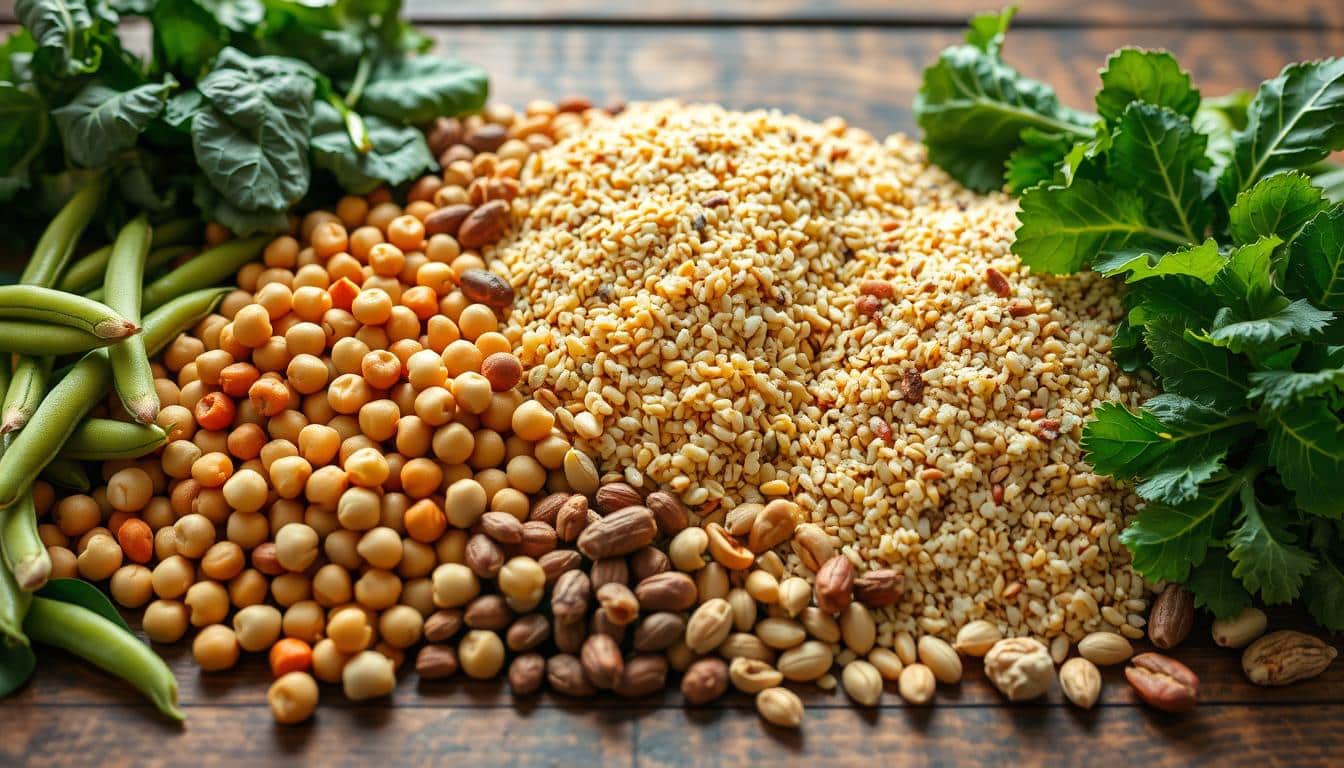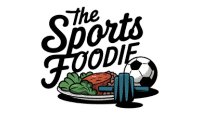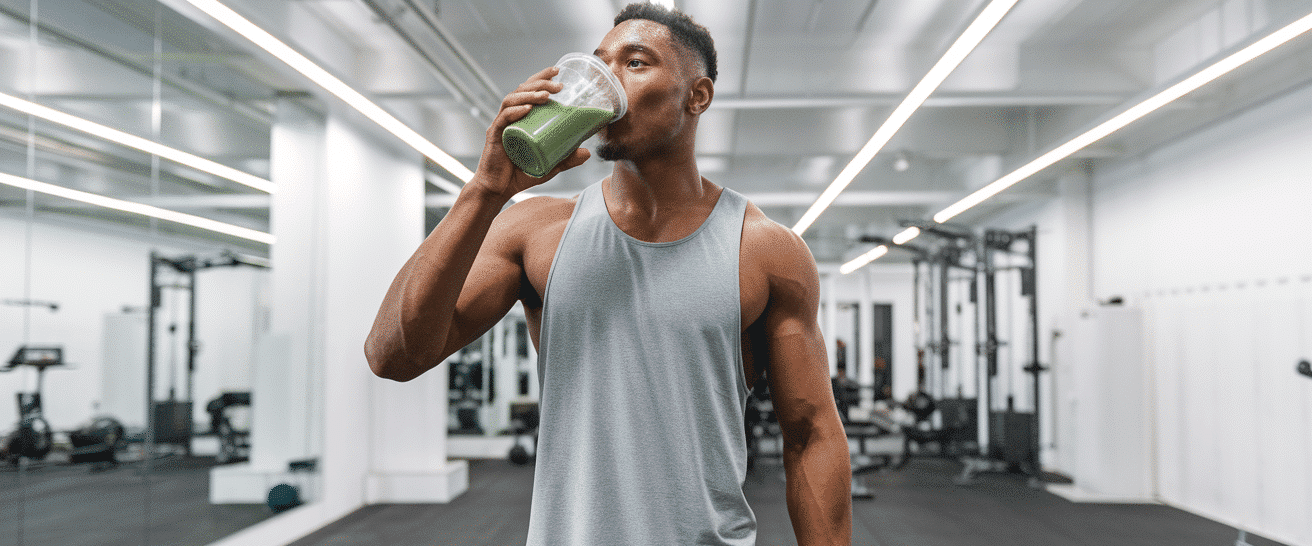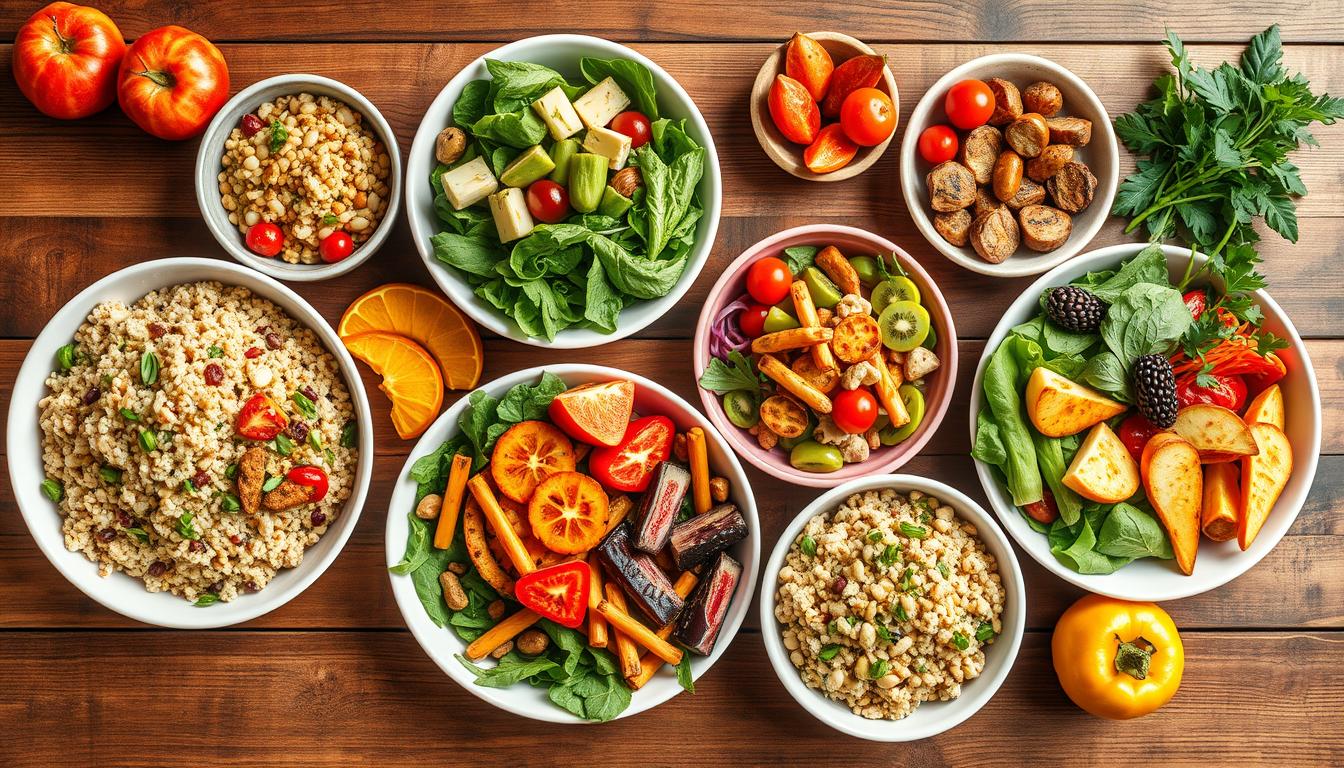If you’re a vegetarian athlete, you’re probably searching for a meal plan that boosts your performance and health. A well-thought-out vegetarian meal plan can give you all the nutrients you need to perform at your best. You can enjoy a wide range of tasty, healthy foods like tofu scramble and lentil pasta.
Following a vegetarian meal plan can help you feel better and stay healthy. It’s all about planning your meals to get the right balance of nutrients. This way, you can meet your athletic needs, whether you’re just starting out or are a pro athlete.
Understanding Athletic Nutrition Needs for Vegetarians
If you’re a vegetarian athlete, knowing your nutritional needs is key. A plant-based diet can give you all the nutrients you need. This includes protein, carbs, and healthy fats.
Protein can come from beans, nuts, and seeds. Carbs are found in whole grains, fruits, and veggies. Healthy fats, like omega-3s, are in nuts and seeds, helping your heart and reducing inflammation.
Plant-based protein powder can also help with muscle growth and recovery. Eating a variety of whole foods is important for top athletic performance.
Some key nutrients to focus on include:
- Protein: 1.2-1.8 grams per kilogram of body weight per day
- Carbohydrates: 5-10 grams per kilogram of body weight per day
- Omega-3 fatty acids: found in nuts, seeds, and plant-based oils

Fueling your body with the right nutrients boosts your athletic performance. Stay hydrated, listen to your body, and adjust your diet as needed. This ensures you get all the nutrients for peak performance.
Essential Protein Sources for Vegetarian Athletes
If you’re a vegetarian athlete, you know how key protein is in your diet. It’s vital for muscle building and repair. Luckily, many plant foods are packed with protein, making it simple to get enough on a vegan meal plan.
A good diet for athletes should have a mix of protein-rich foods. Legumes, tofu, tempeh, and seitan are great options. They’re not just high in protein but also in fiber, vitamins, and minerals. Here are some high-protein plant foods:
- Legumes (15 grams of protein per cup)
- Tofu (20 grams of protein per cup)
- Tempeh (15 grams of protein per 3 oz serving)
- Seitan (21 grams of protein per 3 oz serving)
Adding these protein-rich foods to your vegan meal plans can help you meet your protein needs. It also supports your athletic performance. Don’t forget to include a variety of other plant foods in your diet. This ensures you get all the nutrients needed to build muscle and perform well.

Optimizing Carbohydrate Intake for Energy
As an athlete, you know carbs are your body’s top fuel, mainly during intense workouts. It’s key to know how to get the right carbs for energy. A well-thought vegan diet can give you all the nutrients, including amino acids, for top performance.
Carb loading is a tactic many athletes use to fill up their muscle glycogen. This means eating 10 to 12 grams of carbs for every kilogram of body weight. For instance, if you weigh 70 kilograms, you should eat 700 to 840 grams of carbs. But, remember, this might not work for everyone, and some might need less, like 8 grams per kilogram.
Many athletes turn to animal products for their protein. Yet, a well-planned vegan diet can give you all the protein and amino acids you need. By eating whole, plant-based foods, you can get all the energy and performance nutrients you need.
Here are some tips for getting the right carbs:
- Eat complex carbs like whole grains, legumes, and starchy veggies for lasting energy.
- Try to eat 1 to 4 grams of carbs for every kilogram of body weight 1 to 4 hours before a workout or competition.
- If you’re in an event over two hours, eat 90 grams of carbs per hour to keep glycogen levels up.
Strategic Meal Timing for Performance
As an athlete, you know that good nutrition is key for top performance. But did you know that when you eat matters a lot? Eating the right foods at the right time boosts energy, improves how you perform, and helps with recovery. For instance, eating a meal with brown rice and peanut butter 1-3 hours before working out gives you lasting energy.
Athletes need to adjust how much they eat based on how hard they train and their goals. Many athletes don’t drink enough water, which is bad for them. Water helps your body absorb vitamins and minerals like calcium and iron, which are important for athletes.
To stay on track, think about meal prep with foods like flax seeds and chia seeds. They’re full of omega-3s and fiber. Here are some tips for strategic meal timing:
- Eat a balanced meal with carbohydrates, protein, and healthy fats 1-3 hours before a workout
- Consume a snack with carbohydrates and protein within 30-60 minutes after a workout
- Stay hydrated by drinking plenty of water throughout the day
By following these tips and adding the right foods to your diet, you can time your meals for the best performance. Always listen to your body and tweak your nutrition plan as needed to reach your fitness goals.
Vegetarian Athlete Meal Plan: Weekly Blueprint
If you’re a vegan athlete, you’re probably searching for a meal plan that tastes great and boosts your performance. A well-planned vegetarian diet can meet your nutritional needs and help you reach your athletic goals. Let’s explore a weekly plan that includes almond milk, meal planning, and tips for vegan athletes.
Understanding your nutritional needs is key to meal planning. Vegan athletes should focus on plant-based diets rich in carbs, proteins, and fats. Aim for 45-55% carbs, 25-35% protein, and 20-30% fat in your diet.
Breakfast Options
- Oatmeal with almond milk and fruit
- Tofu scramble with whole grain toast
- Smoothie bowl with plant-based protein powder and almond milk
Lunch Recommendations
- Whole grain wraps with hummus and vegetables
- Lentil soup with a side of quinoa and steamed vegetables
- Grilled tofu or tempeh with roasted vegetables and quinoa
Dinner Recipes
For dinner, choose hearty, plant-based meals packed with nutrients. Some great options include:
- Vegetable stir-fry with tofu and brown rice
- Grilled portobello mushrooms with roasted vegetables and quinoa
- Lentil or vegetable curry with brown rice or whole grain naan
Pre and Post Workout Snacks
Snacking is vital for vegan athletes, before and after workouts. Try these snacks:
- Apple slices with almond butter
- Energy balls made with oats, nuts, and dried fruit
- Smoothie with plant-based protein powder and almond milk
By following this weekly blueprint and incorporating meal planning, you’ll be well on your way to achieving your athletic goals as a vegan athlete.
Supplementation Guidelines for Plant-Based Athletes
As a plant-based athlete, getting all the nutrients is key for performance and health. A good vegan meal plan covers most bases, but some supplements can help. For instance, omega-3 fatty acids are vital for fighting inflammation and stress, but are hard to get from plants alone.
Consider adding vitamin B12, iron, zinc, and omega-3 fatty acids to your routine. Nuts and seeds can also boost your nutrient intake. Plant-based protein powder is handy for meeting protein needs, paired with a balanced vegan diet.
Here are some benefits of supplementation for plant-based athletes:
- Reduced risk of nutrient deficiencies
- Improved performance and recovery
- Enhanced overall health and well-being
Choosing high-quality supplements is critical. They should match your dietary needs and preferences. Always talk to a healthcare professional or registered dietitian to find the right supplements for you.
| Supplement | Benefits | Recommended Daily Intake |
|---|---|---|
| Vitamin B12 | Energy production, nerve function | 2.4-2.6 mcg |
| Iron | Red blood cell production, oxygen transport | 8-18 mg |
| Zinc | Immune function, wound healing | 8-11 mg |
| Omega-3 fatty acids | Reducing inflammation, improving heart health | 250-500 mg |
Building Muscle on a Vegetarian Diet
To build muscle on a vegetarian diet, focus on a variety of plant foods. A well-planned vegetarian diet gives you all the nutrients for muscle growth. This includes protein, carbs, and healthy fats. Legumes, beans, and lentils are great sources of protein for athletes.
Eating 20-30 grams of protein at each main meal helps muscle growth. Pairing proteins like beans and rice or nut butter and whole grain bread gives you all the amino acids needed. With a balanced diet and regular strength training, you can build muscle and reach your fitness goals.
Here are some tasty and effective muscle-building meals:
- Lentil soup with whole grain bread
- Quinoa salad with roasted vegetables and nuts
- Grilled tofu with brown rice and steamed broccoli
Building muscle on a vegetarian diet takes patience and dedication. With the right plant foods and strength training, you can achieve your fitness goals and build strong muscles.
| Food | Protein Content |
|---|---|
| Legumes (1 cup cooked) | 15 grams |
| Nuts and seeds (1/4 cup) | 8 grams |
| Whole grains (1 cup cooked) | 5 grams |
Addressing Common Performance Challenges
As a vegetarian athlete, you might face special challenges that affect your performance. These include needing more calories, keeping iron levels up, and getting enough protein. A well-thought-out vegan diet can give you all the nutrients you need for top performance and recovery.
To tackle these issues, add calorie-rich snacks like peanut butter and brown rice to your meals. Also, eat iron-rich foods like spinach and kale to keep your iron levels steady. Make sure to get enough protein by eating different plant-based sources. Legumes, nuts, and whole grains are great because they have all the amino acids you need.
Here are some tips to help you overcome common performance challenges:
- Incorporate iron-rich plant foods into your diet to maintain iron levels
- Consume a variety of plant-based protein sources to ensure adequate protein intake
- Include calorie-dense snacks like peanut butter and brown rice to meet increased calorie needs
By following these tips and sticking to a well-planned vegan diet, you can beat common performance challenges. Stay focused on your nutrition and training. If you need personalized advice, don’t hesitate to ask a healthcare professional or registered dietitian.
| Challenge | Solution |
|---|---|
| Meeting increased calorie needs | Incorporate calorie-dense snacks like peanut butter and brown rice |
| Maintaining iron levels | Consume iron-rich plant foods like spinach and kale |
| Ensuring adequate protein intake | Eat a variety of plant-based protein sources, including legumes, nuts, and whole grains |
Conclusion: Thriving as a Vegetarian Athlete
You’ve got all the tools you need to thrive as a vegetarian athlete! We’ve covered essential nutrients like flax seeds, chia seeds, and almond milk. These can fuel your athletic performance. A well-planned plant-based diet can give you all the fuel you need to reach new heights.
Keep experimenting with new meal planning ideas and recipes. This will keep your meals exciting and nutritious. Listen to your body, stay consistent with your nutrition, and watch your athletic performance soar. You’re not just surviving as a vegetarian athlete – you’re thriving! Now go out there and show the world what plant-powered performance looks like.


